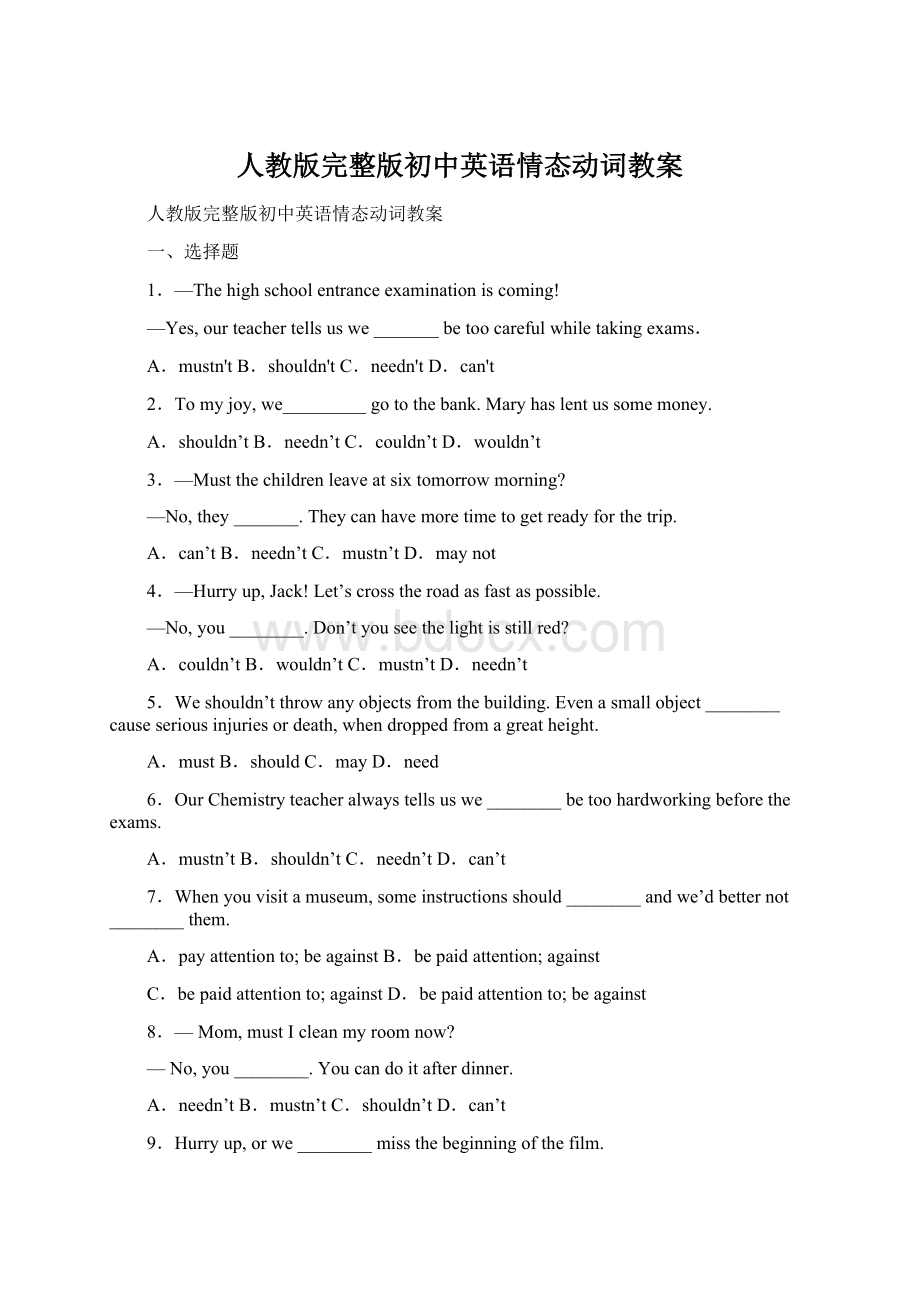人教版完整版初中英语情态动词教案Word下载.docx
《人教版完整版初中英语情态动词教案Word下载.docx》由会员分享,可在线阅读,更多相关《人教版完整版初中英语情态动词教案Word下载.docx(14页珍藏版)》请在冰豆网上搜索。

9.Hurryup,orwe________missthebeginningofthefilm.
A.shouldB.mustC.mayD.haveto
10.It’samazingthatthepen________turnvoiceintotextwithfewmistakes.
A.canB.mustC.mayD.need
11.—Whoissingingnextdoor?
Itsoundslikeayounggirl’svoice.
—It_________beJane.ButsheseldomsingsEnglishsongs.
A.needB.mustC.mayD.can
12.---Willyoubebackearlythisevening?
---Yes,butI________bealittlelate.Ourbosssometimeshasextraworkforus.
A.mayB.mustC.needD.will
13.We’vediscussedeverydetailofthisplanandhavegoteverythingready.Butstillsomething__________gowrong.Westillhavetobeverycareful.
A.mustB.shouldC.wouldD.may
14.WhenIwasyoung,myfather___________takemetoclimbthehillwhichwasnotfarfromourhouse.
A.mayB.mustC.wouldD.should
15.—Wouldyouplease________inthatway?
That’snotsafe!
—Sorry.Iwon’tdoitanymore.
A.notdrivingB.nottodriveC.nodrivingD.notdrive
16.—Ready?
Let’sgetstarted,Martin.
—Swimming?
Ijust________
getusedtoitinwinter.
A.can’tB.needn’tC.mustn’tD.shouldn’t
17.—WillyourmotherbeathomethisSaturday?
—Hardtosay.She_______gotothecountrysidetoseemygrandparents.
A.mustB.mayC.canD.would
18.Thinktwicebeforemakingadecision,oryou__________getintotrouble.
A.mayB.can'
tC.shouldn'
tD.mustn'
19.Don’tcrosstheroaduntilthetrafficlightsturngreen.Acar_______hityou.
A.needB.mayC.shouldD.must
20.Alotofonlineresources________beusedeitherbyteachersatschoolorparentsathome.
A.canB.shouldC.needD.must
21.—ThesandstorminBeijingissoseriousthisyear.
—Yes,Iwonderwhenwe________worryabouttheairwebreathe.
A.can’tB.mustn’tC.needn’tD.shouldn’t
22.—Whatisthatyounglady’sjob?
—She________beanurse,I’mnotsure.
A.mustB.mayC.needD.would
23.Mostyoungpeoplelikeshoppingonlinebecausethey________spendmuchtimegoingfromshoptoshop.
A.needn’tB.can’tC.mustn’tD.shouldn’t
24.You________paytoomuchattentiontoprotectingyourselfifyouplantogoabroad.
A.mustn’tB.can’tC.shouldn’tD.needn’t
25.—ShallItellhimthechangeofthetimerightnow?
—I’mafraidyou________,otherwisehewillbelateforthemeeting.
A.canB.mayC.mustD.need
26.—Willdadarrivehomeat6o’clocktohavedinnerwithusthisevening?
—Ithinkhewill,buthe________not.Sometimesheworksextrahours.
A.canB.mustC.needD.may
27.—MustwestoptheJapanesegovernmentdischargingnuclearwastewater(排放核污水)intothePacificOcean?
—________.Becauseeveryoneshouldprotectourearthanditisbad________ustoeatthepollutedseafoodanddrinkthewastewater.
A.Yes,wecan;
ofB.No,wemustn’t;
ofC.Yes,wemust;
forD.No,weneedn’t;
for
28.—Excuseme.Ihaven’tfinishedreadingthebookyet.MayIkeepitabitlonger?
—Sorry,you________.Youmustreturnitontime.
A.needn’tB.can’tC.won’tD.shouldn’t
29.—Howdoyoulikemynewdress?
—Well,ifI________say,itisnotsuitableforyou.
A.mayB.mustC.havetoD.should
30.Sometimessmiles________befalse,hidingotherfeelingslikeanger,fearorworry.
A.shouldB.wouldC.mustD.can
31.Ahard-workingman________becomeagreatscientist,butagreatscientist________beahard-workingman.
A.can’t;
canB.maynot;
mustC.can’t;
mustD.maynot;
can
32.—Thearticlesaysthataperson’sanimalsigndecideshispersonality.
—You________readitforfun,butdon’tbelieveinthat.
A.canB.mustC.shouldn’tD.needn’t
33.—Mum,Iboughtsomestrawberriesonmywayhome.
—Oh,you’resosweet.Butthestrawberries________beputintothefridgeforfreshness.
A.mustB.canC.mayD.need
34.—InChina,manystudentshavetostayuplatetodotheirhomework.
—Noworries.Thegovernmenthasrealizedtheproblem.I’msurethere________begoodnewssoon.
A.canB.shouldC.mustD.need
35.—Who’sthemanoverthere?
IsthatMr.Black?
—It________behim.Mr.Blackismuchtallerthanthatman.
A.mayB.mustC.can’tD.mustn’t
36.—MayIhavesomewinetodrink?
—No,you________.Youhavetodrivehomelater.
A.mustn’tB.needn’tC.can’tD.maynot
37.—Who’ssingingnextdoor?
IsitMissWang?
—It________beher.She’shavingtheboardmeeting.
A.can’tB.shouldn’tC.mustn’tD.needn’t
38.—Dowehavetofinishthistoday?
—Yes,you________.Todayisthelastday.
A.wouldB.mayC.canD.must
39.Sorry,smokingisnotallowedhere.Ifyou________,youwillbefinedaccordingtotherules.
A.canB.willC.mayD.must
40.Cars________givewaytowalkersonsomeroadsinBinhai,orthedriverswillbefined.
A.mayB.willC.canD.must
【参考答案】
1.D
解析:
D
【详解】
句意:
——中考就要来了!
——是的,我们的老师告诉我们考试的时候我们再怎么仔细都不为过。
考查情态动词。
mustn'
t禁止;
shouldn'
t不应该;
needn'
t不需要;
can'
t不能、不可能。
根据“whiletakingexams”可知这里应用can'
t,can'
tbetoo+adj.表示“再……也不为过”,故选D。
2.B
B
使我高兴的是,我们不必去银行了。
玛丽借给了我们一些钱。
考查情态动词辨析。
shouldn’t不应该;
needn’t不必,不需要;
couldn’t不可能;
wouldn’t不会。
由“Maryhaslentussomemoney”可知,玛丽已经借给我们钱了,所以我们不必再去银行了。
故选B。
3.B
——孩子们明天早上六点必须离开吗?
——不,他们不必。
他们可以有更多的时间为旅行做准备。
can’t不能;
needn’t不必;
mustn’t禁止;
maynot可能不会。
根据“Mustthechildrenleaveatsixtomorrowmorning?
”可知,此处为Must引导的一般疑问句,否定答语要用need’t或don’thaveto,故选B。
4.C
C
——快点,杰克!
让那个我们尽快地过马路。
——不,你不能这样,你没有看到是红灯吗?
couldn’t不能,不会;
wouldn’t不愿意;
mustn’t禁止,不要;
needn’t不需要,不必。
根据下文“Don’tyouseethelightisstillred”可知,现在是红灯,禁止过马路,故选C。
5.C
我们不应该从大楼上扔任何物体。
当从很高的高度掉落时,即使一个小的物体可能导致严重的伤害或死亡。
must必须;
should应该;
may可能;
need需要。
根据“Evenasmallobject…causeseriousinjuriesordeath,whendroppedfromagreatheight”可知,从高空中掉落一个小的物体都有可能造成伤害或死亡,表示可能性用may,故选C。
6.D
我们的化学老师总是告诉我们考试前怎样用功都不为过。
mustn’t不能,表禁止;
shouldn’t不应该,表建议;
needn’t不必,指没有必要;
can’t不能,表没有能力或不许可。
根据题干“we…betoohardworkingbeforetheexams”,可知是“can’tbetoo+形容词”结构,表示“再……也不为过”。
故选D。
7.D
当你参观博物馆时,应该注意一些说明,我们最好不违反它们。
考查含情态动词的被动语态和情态动词跟动词原形。
“someinstructions”和“payattentionto”属于被动关系,所以第一个空用“shouldbepaidattentionto”结构,所以排除A、B;
hadbetternotdo/be意为“最好不做某事”;
against“反对”,介词,所以第二个空用动词短语beagainst“反对”。
8.A
A
——妈妈,我现在必须打扫房间吗?
——不,不需要。
你可以在晚饭后做。
needn’t不需要;
can’t不能。
根据英语语法,对于must开头一般疑问句,若要作否定回答,可用needn’t,不用mustn’t。
故选A。
9.C
快点,否则我们可能会错过电影的开头。
haveto不得不。
根据语境可知,此处表推测,故应用情态动词may。
故选C。
10.A
神奇的是,这支笔能把声音转换成文字,而且很少出错。
考查情态动词词义辨析。
can能够,可以;
may可以,可能;
此句是说这支笔能够把声音转换成文字,表示一种能力,应用can,故选A。
11.C
——谁在隔壁唱歌?
听起来像是一个年轻女孩的声音。
——可能是简。
但是她很少唱英文歌。
need需要;
must一定;
can能,会;
表示推测时,常用于否定句和疑问句中。
根据“It...beJane.ButsheseldomsingsEnglishsongs.”可知,此处表示不确定的推测,且是肯定句,故选C。
12.A
——你今晚会早点回来吗?
——是的,但我可能会晚一点。
我们的老板有时有额外的工作要做。
A.may也许;
B.must必须;
C.need需要;
D.will将,将会。
由下文的句子Ourbosssometimeshasextraworkforus.我们的老板有时有额外的工作要做。
可知,今晚我可能会晚一点回来。
因此用maybe表示推测;
选项B/C/D不符合语境。
13.D
本题考查:
情态动词辨析。
选项分析:
A.must必须,一定。
B.should应该;
就;
可能;
将要。
C.would将,将会(will的过去式)。
D.may可以,能够。
综合分析前后句,可知此处填may最合适,完整句意为:
We’vediscussedeverydetailofthisplanandhavegoteverythingready.我们已经讨论了这个计划的每个细节,一切都准备好了。
Butstillsomethingmaygowrong.但仍有可能出错。
Westillhavetobeverycareful.我们还是要非常小心。
正确答案为:
【点睛】
would,could,must,might,may,can都可以表示“可能性”:
按照可能性的大小可以排序为might、may、could、can、should、would、must。
也就是说,might表示最小的可能性,must则表示达到最大的可能性。
如:
Hemightbeathome.他或许在家(但是可能性不大)。
Hemaybeathome.他或许在家(稍有那么一点儿可能)。
Hemustbeathome.他一定在家。
此外,它们还表示各自独特的意思:
may/might表示有应承,即“可以”;
can/could表示有能力,即“能够”;
should表示有义务,即“应该”;
would表示有愿望,即“愿意”;
must表示有必要,即“必须”。
14.C
在我小的时候,我的父亲会带我去爬山,那离我们家不远。
would将要;
should应该。
本题考查情态动词的用法,由WhenIwasyoung可知,when引导的从句为一般过去时,因此主句应为过去的某种时态;
再结合句意及选项,可知C选项符合题意,would+动词原形是过去将来时;
故答案选C。
15.D
——请不要以那样的方式开车可以么?
那不安全。
——对不起,我不会再那样做了。
考查动词。
driving开车,动名词/现在分词形式;
todrive动词不定式;
drive动词原形。
情态动词would后面用动词原形,否定词not放在drive前面。
16.A
——准备好了吗?
我们开始吧,马丁。
——游泳?
我只是不能习惯冬天游泳。
shouldn’t不应该。
根据get
used
to
it
in
winter“习惯冬天游泳”可知,应该是“不能”习惯冬泳,用can’t,故答案选A。
17.B
——你妈妈这周六将在家吗?
——很难说。
她可能去乡下看我的祖父母。
must一定,表示有把握的推测;
may可能,表示没有把握的推测;
can可以,表示允许;
would愿意,表示意愿。
根据“Haretosay”可知,此处表示没有把握的推测,因此用may,故选B。
18.A
做决定前要三思,否则你可能会惹上麻烦。
mustn’t不允许;
根据语境理解可知,此处表达的是“可能”,是一种不太肯定的推测,英语用may,故选A。
19.B
在交通灯变绿之前不要横穿马路。
汽车可能撞到你。
must一定。
分析句意可知,交通灯变绿之前横穿马路,汽车有可能会撞到你,故此处应用may表推测。
20.A
很多在线资源既可以供学校的老师使用,也可以供家长在家使用。
can能,可以;